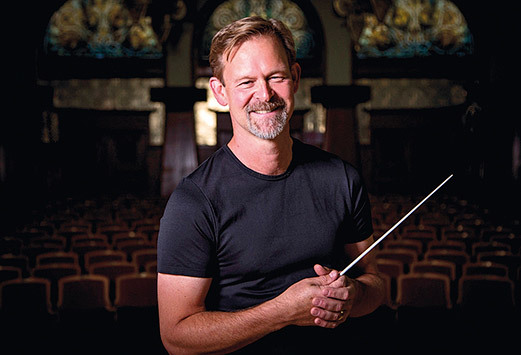Many, if not most music directors of Indonesian orchestras seem to begin by considering the public’s existing preferences in determining the orchestra’s musical direction. Instead, based on an observation of past and future concert programs, you seem to have begun with an ideal and expect the rest to follow. Why? How would you define the music direction of the Bandung Philharmonic?

A perceptive question! Bravo. Orchestras – and the conductors – must hold several issues in tension when selecting the repertoire of the concert programs. 1. We must address the ‘contextual’ issue – What is relevant to this particular audience? What will they enjoy and support? 2. The ‘calling’ of every orchestra – What ‘truth-telling’ place does music (and art) have in this place and in the world? How can music be both pleasant to listen to and an important and respected voice that speaks truth to culture – even sometimes a hard truth? 3. What should we play that will help this particular orchestra flourish and thrive and grow? And 4. How can we celebrate the musical legacy and history of the symphony orchestra? What great works of art have composers written that need to be maintained and celebrated across cultural lines? A tough set of questions, to be sure – but all of which we consider when choosing music for the Bandung Phil.
Starting something new may not be easy, but sustaining it can be even more challenging. How do you hope to sustain public interest in the orchestra beyond its novelty phase?
Starting something new is FAR from easy – just ask our Executive Director, Airin Efferin! But you raise an important issue we have been trying to address while getting the ensemble established. We work hard internally to constantly improve the orchestra– but we also work hard externally by introducing many of our audience to this body of artwork for the very first time. Hearing a live performance of Beethoven’s Symphony No. 3 ‘Eroica’ is not something that many of our audience had experienced prior to April 2016. It was an honor to introduce that work – and many that have followed – to these friends. My sincere hope is to find that balance of getting people excited about classical symphonic music – while also celebrating the great musical traditions of Indonesia. We try to strike a good balance – while keeping our mission clear.

The Indonesian diaspora of musicians is perhaps one of the country’s most untapped resources in music. As music director, have you any plans to include this talent pool in your roster of guest soloists?
Most certainly. In addition to having the orchestra made up of some 95% Indonesian players, we have several Indonesian soloists – living both at home and abroad – on the list for upcoming concerts. Another way we are consciously including the Indonesian musical voice is through commissioning new works. I am very proud to say that at every concert of the Bandung Phil we play a World Premiere of a new work by an Indonesian composer; at every concert! Singgih Sanjaya, Budi Ngurah, Marisa Hartanto, Fauzie Wiriadisastra, Arya Kitti are just some of the Indonesian composers who have written works for the Bandung Phil. We also just held our first Composer Competition for young Indonesian composers and will perform a new work called Suvenir Dari Minangkabau at our next concert in September.
Lastly, the Bandung Philharmonic has so far been a breath of fresh air in almost every aspect I can think of. Therefore, please allow me to hope that this new orchestra will not continue the tradition among other Indonesian orchestras of ignoring the guitar concerto repertoire.
Ha ha! Certainly not, John Paul! And terima kasih for the challenge! Vivaldi, Rodrigo, Villa Lobos, Piazzola… here we come! So much great music to play… and so little time. Seriously, it is wonderful that people have their favorite music or composer or ensemble. We had some patrons very much interested recently in Strauss Waltzes – so we are playing ‘The Beautiful Blue Danube’ in September as part of an all dance music concert. There is great interest in Opera, so we are playing an Opera favorites concert next season. All this while trying to hold to those things I mentioned earlier – context, calling, excellence and history. I think the Bandung Phil – and our wonderful audience – is up to the challenge.







